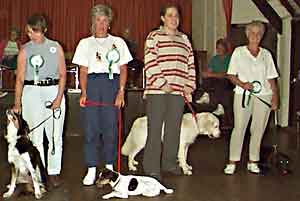Bringing up Puppy
Training Clubs

basic training at a good dog club is helpful
It is an excellent idea to enroll on a basic pet dog training course.
Before your puppy comes home go and watch classes at several local training organisations and clubs to see if you are happy with the standard of training and the attitude of the trainer. Anyone who wants to take your money without allowing you to view and evaluate their training probably has good reason for doing so.
As a guide;
- classes should be small enough to ensure that everyone gets plenty of personal attention, 8 people is the realistic maximum for a class with one trainer and one assistant, 6 is better.
- most people and their dogs should be doing something
most of the time. Avoid classes where people are sitting around for
long periods just waiting for their "turn".
the trainer should be giving regular feedback and advice to each person on their performance not simply directing a "drill". - except for very young puppies (up to 18 weeks maximum) dogs and puppies should not be allowed to indulge in "free for all" sessions at classes. By 18 weeks puppies are able to socialise freely with other dogs and do not need to go to classes to do so. Uncontrolled "free for all" sessions teach dogs and older puppies to ignore their handler, indulge bullying behaviour, risk serious injuries (especially on slippery floors), encourage a lack of respect for other dogs and can lead to behaviour problems as a result of being allowed to terrorise other dogs or being themselves terrorised.
- dogs should not be constantly barking, this is usually a sign of stress, dogs should settle quickly at the class and any barking curtailed by distracting the dog with concentration exercises. Dogs should not be subject to punishment by physical or other abuse including squirting with water, a dog that is doing something will settle to the job in hand.
- the classes should not include dogs with obvious behaviour problems (these should be addressed individually in private sessions)
- look for a competent, sympathetic and receptive trainer, preferably a member of the British Institute of Professional Dog Trainers, who listens to what you want to teach your dog and who has a flexible and cheerful attitude.
- the trainer should be approachable, open and ready to answer questions knowledgeably, avoid classes where the trainer is argumentative or dogmatic, there should be no shouting, humiliating or bullying and no one should be ignored, no matter how difficult they are finding the learning process.
- if the classes are aimed at the owners of family
pets, the whole family should be welcome, of course children should
be well behaved and kept under control but no one should be made to
feel unwelcome or uncomfortable.
- some instructors like to demonstrate with their own or an assistant's dogs, this is fine to a point but avoid classes where the trainer spends a large part of each class showing off rather than instructing or where the trainer is preoccupied coping with their own dog. The best trainers make the class members, not themselves, the centre of attention and will usually be unhindered by handling a dog themselves.
- classes should be relaxed, safe and fun, people should be working hard and enjoying themselves.
- the curriculum should be structured and appropriate, most pet owners don't need their dog to learn a slick retrieve and present if they can't get the dog to walk nicely on a loose lead.
- the trainer should be equitable in their attitude to the dogs in the class and sympathetic to the differences between breeds. A Border Collie learns at a different rate and does things differently than a Golden Retriever, neither is more clever or better, they are just different, avoid trainers who are rude or critical of this breed or that breed.
- trainers should be focused on training the class and treat all handlers with the same respect and attention, avoid classes where the trainer spends the time chatting to friends or where there is an "inner circle" of favoured handlers.
- trainers should be able to train people, it is no good having a trainer who can train their own dog to perfection if they can't enthuse and educate people, you will be training your dog not them and you need to understand how to do it.
And Remember
ALWAYS KEEP YOUR DOG ON A LEAD NEAR TRAFFIC OR LIVESTOCK!
| Back to previous "bringing up puppy " page |
Back to Main Puppy page |
| Seasons |
|
|||||||||||||||||
|